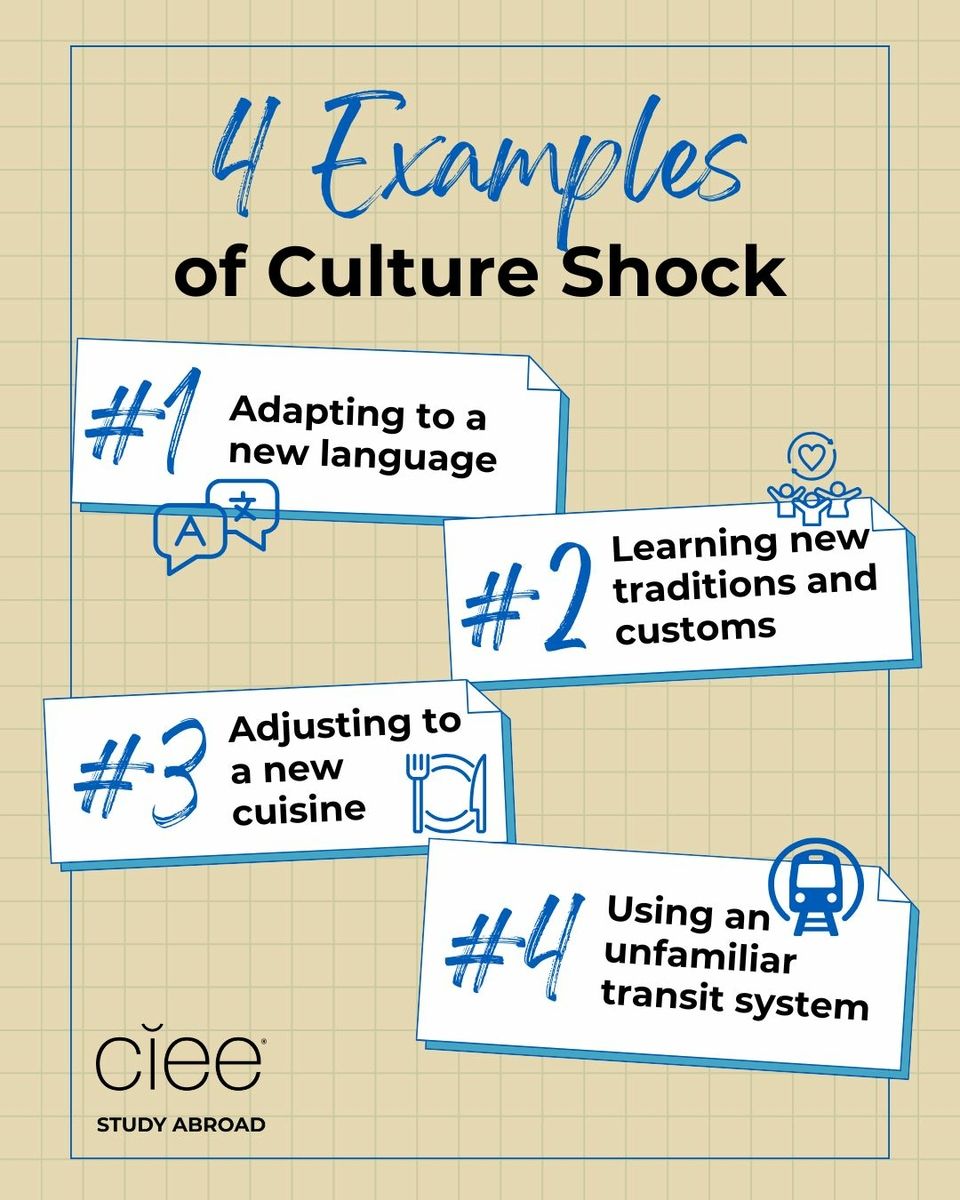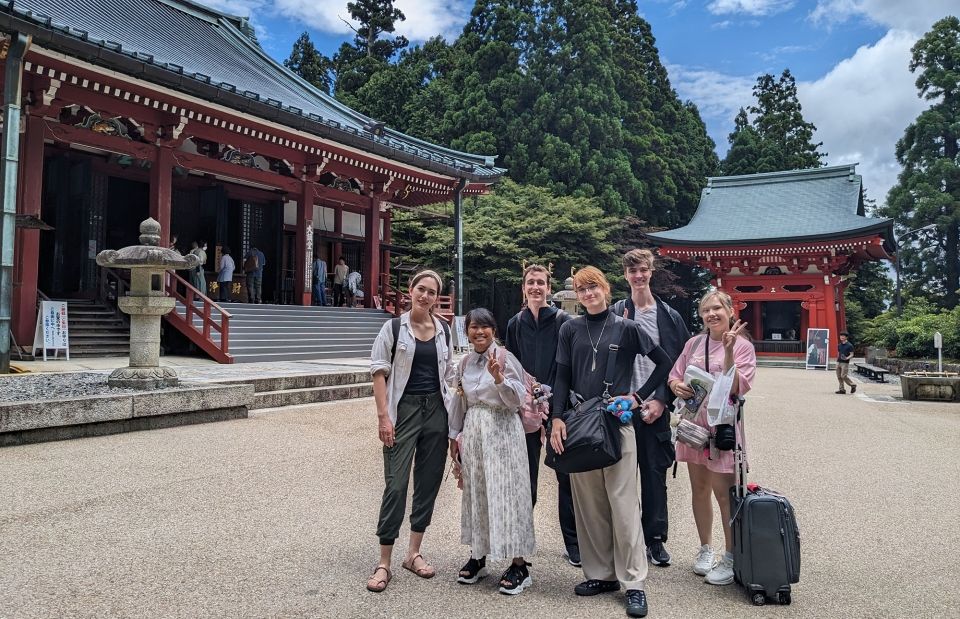What is Culture Shock? 4 Examples and Tips to Adjust
A possible result of traveling internationally is culture shock. And this phenomenon can happen when you study abroad, too. Don’t get too overwhelmed by this – culture shock can sometimes be inevitable, and we have plenty of tips and advice on how to adapt to cultures new to you during your study abroad adventure.
So, while you may be wondering, “What is culture shock,” we’ll not only provide the meaning of culture shock, but we’ll also dive deep into the topic and help set your mind at ease as you prepare for the experience of a lifetime.

What is Culture Shock?
Culture shock is a sense of confusion and uncertainty experienced by someone subjected to an unfamiliar culture, way of life, or set of attitudes without adequate preparation. People who experience culture shock may also feel anxious and disoriented.
Many people experience culture shock when they travel to new countries and adjust to foreign cultures; it usually occurs in the first month or two of entering a new community with its own unique culture. It is common and completely normal to have this experience, and there are ways to relieve these feelings of confusion and uncertainty.
It’s important to remember that even when dealing with these sensations, you’ll still enjoy exploring new places and people. Culture shock is something to work through during your study abroad program. And we’re here to help!

Culture Shock vs. Reverse Culture Shock
If you’ve heard of culture shock before, you’re likely familiar with the term “reverse culture shock,” too. Reverse culture shock refers to similar feelings of confusion and uncertainty experienced by people when they return to their home countries after living in a foreign place for an extended period of time.
Reverse culture shock is also a common experience felt by many international travelers. Many of the same tips and tricks you can do to prepare yourself to study and live abroad and alleviate culture shock can be applied as you plan to head home, too (we know, we know, you’re not ready to think about coming home before you even get started!).
Read More: Reverse Culture Shock is Real
What Are Examples of Culture Shock?
Culture shock can be brought on by many different experiences you may have while you study abroad. Let’s take a closer look at some of these culture shock examples together.
Example #1: Adapting to a new language.
Depending on your study abroad program of choice, you might find yourself living and studying in a new international city where English isn’t commonly used. While much of the world speaks English, populations around the world prefer speaking, or may only communicate, in their native tongue, and most public spaces, including signs, transportation systems, and more, will likely be in another language.
You may start to experience culture shock or feelings of uneasiness when you’re navigating your new international city or when trying to communicate with others. Remember, this is normal.
Read more: 10 Best Foreign Language Programs
Example #2: Learning new traditions and customs.
It will take some time to get used to your study abroad destination’s traditions and customs, which will vary depending on where you decide to take your studies. For example, in Japan, it’s considered impolite to talk on the phone when using public transportation, and it’s common practice to remove your shoes before entering someone’s home. In Denmark, eye contact is important when meeting new people.
Again, it’s normal to feel a bit of culture shock as you learn new traditions and customs – be patient with yourself and others around you as you continue to absorb your new surroundings. Learning about new traditions and customs is a large part of your study abroad experience – take it in stride!

Example #3: Adjusting to a new cuisine.
One of the significant benefits of a study abroad program is the gastronomical adventure you’ll get to go on! Although you’ll find new favorite foods and scope out exciting restaurants in your new international city, you’re bound to come across a few dishes you might not enjoy and may miss foods from your home country from time to time. This is a typical example of culture shock.
Don’t let adjusting to new cuisine deter you during your travels! When you’re really missing some comfort food from home, there are usually some grocery stores or recognizable food chains available in your new city where you can find some more familiar items.
Example #4: Using an unfamiliar transit system.
You’ll need to learn how to get around your new study abroad city, and this likely means using a new transit system. Make sure to lean on your resources, like CIEE staff and colleagues, and maybe even your homestay family (if you’ll live with one), to learn how to navigate this new system. It’s completely normal to struggle with an unfamiliar transit system – you may have even experienced this in a city in the U.S. before. Remember, deep breaths – you got this!
How to Deal With Culture Shock Abroad
Now that we’ve outlined four culture shock examples, let’s review how you can relieve the feelings associated with culture shock when you’re abroad and why preparation ahead of your travels is essential.
Tip #1: Try to prepare ahead of time.
Preparation is key when learning how to manage culture shock when you’re studying abroad. Using our culture shock examples, note how you can plan ahead of your trip to navigate these possible situations.
- Adapting to a new language: While you likely won’t be totally fluent in your study abroad location’s primary language, it’s a smart idea to do some research about languages that are spoken in your new city and learn some keywords and phrases ahead of time. Trying some language learning apps and packing a language travel book will help!
- Learning new customs and traditions: Research. Research. Research. Rent a book at your school’s library about customs and traditions in your study abroad destination to familiarize yourself with a few major ones. Seek out CIEE alums who have traveled to the same study abroad location and speak with them about their experiences. You can even reach out to us, too, for some more information. We’re happy to help!
- Adjusting to a new cuisine: Look at everyday dishes in your study abroad destination and note those that sound appealing to you. It’s also smart to reference a city map to pinpoint different markets and restaurants to try – you’ll find something you like. Don’t worry.
- Using an unfamiliar transit system: Just like learning new customs and traditions, it’s a good idea to research your new city’s transit system and what to expect. You’ll have CIEE teams and colleagues to help you navigate a new system, too.
Doing some research and really planning ahead of your study abroad program will help reduce feelings of culture shock immensely. And lean on the resources available to you too. Your school’s study abroad office, academic advisor, and even us – your CIEE support team – will help with any questions you may have.

Tip #2: Embrace the unknown.
We know that if you’re about to embark on a study abroad adventure, you’re naturally curious, passionate, and not afraid to take chances. Lean into all these wonderful qualities as you navigate your new international city and deal with culture shock. You’re going to be okay. And the experience will make you that much stronger.
Read more: Why Study Abroad? Top 7 Benefits of Studying Abroad
Tip #3: Get to know locals and understand their cultural differences.
One of the best ways to combat culture shock is to embrace the new culture you’re in, and one of the most impactful ways to do that is by interacting with locals and learning from them.
Most people you’ll meet during your travels will be accepting of others who genuinely want to learn more about them and their way of life. When you approach locals, like a university professor, new classmate, or even a museum tour guide respectfully and politely, you’re bound to receive a more welcoming response and learn a lot about not only their experiences, but the cultural differences between you two as well.
This is the magic of studying abroad – bridging the gaps between differences and diving deep into other cultures. And bonus: It’ll help alleviate some culture shock, too, because finding meaning in something new helps.
Tip #4: Take time to check in on yourself.
We know that as you explore your new international city, you’ll want to stay on the go – taking in as much as you can while prioritizing your studies and meeting new people from all over the world. And while you’ll get to do plenty of that, a crucial way to manage culture shock is to check in with yourself occasionally.
You can try journaling in the evening before bed or first thing in the morning when you wake up to keep track of your thoughts and feelings and genuinely reflect on how you’re doing as you go through this new experience. You’ll know if you’re doing okay, and you’ll know if you need a little extra support – checking in with yourself will help you catch those feelings faster and help you continue to enjoy your study abroad experience.

Tip #5: Stay connected with those at home.
Stay in touch with your friends and family with international messaging apps, like WhatsApp, or go old school and send them postcards as you bounce around from city to city! Staying connected with your people back home will help keep you grounded as you continue your study abroad adventure and help prepare you for your return.
You’ve Got This!
Culture shock is common when traveling across the globe, and as someone who’s about to embark on an epic international adventure, you may experience it as well. It’s very normal. Follow our advice and be confident – you will have the time of your life and manage the possibility of culture shock all at the same time.

